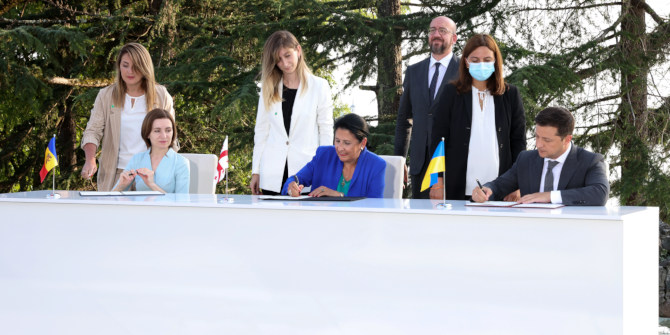Asylum seekers travelling to Europe via irregular migration routes often rely on assistance from lawyers, NGOs, and volunteers following their arrival. Drawing on research conducted in Greece, Gemma Bird details the risks that these individuals and organisations take in their efforts to provide support.
Increased attention is now being paid to the illegal activity of ‘pushbacks’, the forceful, dangerous and often deadly practice of preventing access to asylum at state borders. However, it is also vital that increasing risks faced by lawyers, NGOs and activists working to support asylum seekers are also recognised.
The criminalisation of humanitarianism is by no means a new occurrence, with sea rescues leading to arrests and refugees who have been forced to steer the boats they are fleeing on to save the lives of others accused of smuggling. Affected communities, activists, journalists and academics alike have continued to raise awareness of the violence and criminalisation occurring at the borders of Europe and elsewhere. In what follows, I focus on the specific example of Greece.
In May 2021, the Council of Europe pushed Greece to investigate a series of alleged pushbacks in the Aegean sea and there have been ongoing disputes between Greece and Turkey about the responsibilities of both countries at their land and sea borders. Whilst these political disputes go on, lives continue to be lost. Against this backdrop, NGOs, activists and lawyers have been put in ever more difficult situations as they continue to raise awareness of, and fight against, pushbacks and broader instances of border violence, whilst also at increased risk of criminalisation.
Speaking to groups based in the Aegean, we are reminded of how hostile the environment is, both for people on the move and the people working to support them. One person told me that the current agenda is to ‘silence those in and working alongside displaced communities… to criminalise those speaking out about inhumane treatment’. This can be seen, for example, on the island of Samos, where in September 2021 a new Closed and Controlled Access Centre (CCAC) was opened – a new model for reception in Greece’s border regions.
The CCAC is located in a remote part of the island, surrounded by barbed wire fences, with gated entrance and exit procedures. It is over 7km from the island’s main town, deep in a mountainous region. Prior to the opening of the CCAC, those seeking asylum were housed in the Reception and Identification Centre situated next to the main town of Vathy. Whilst the conditions in the camp were appalling, with reliance on informal shelter unsuitable for the weather conditions, unsanitary facilities and often inedible food, the location of the camp did at least ensure access to the NGO support on the island that was able to be based in the town.
Over the years this has included a kitchen and restaurant, a women’s centre, various education and community centres and spaces for distributions. The move towards further isolation and reliance on ‘prison like’ structures is just one aspect of the criminalisation and othering faced by people seeking asylum in Greece. This is yet another approach that distances and excludes displaced people from the local community and support networks.
At the same time, one activist reminded me that NGOs and activists find themselves in difficult positions and face growing risks of criminalisation. Every day they wake up and face the dilemma that they are ‘trying to do something’ within the system to support the people often being harmed by it. At the same time, they are very aware of the risks, not just to themselves but also to the people they are supporting, people on the move who are often forced to exist in terrible, ‘prison like’ conditions within camps and Reception Centres.
Without NGO support, people within the asylum system would face even worse situations, with extremely limited access to healthcare, education, and community driven activities. It is therefore vital to ensure that NGOs continue to be able to provide said support. The question, then, is how, in an increasingly hostile environment, to continue to deliver this support and actively denounce state policies and activities.
A key thing to keep note of here, which I was reminded of by someone active within these support networks, is that ‘from an outside perspective, it is difficult to understand just how hostile the system has become. It is imperative to support the [displaced] community and allies and resist the environment of fear that is being cultivated’. This, then, is not just a role for people on the ground. It is also a role for wider communities both in Greece, the European Union and internationally.
As journalists continue to highlight the alleged role of state and international actors in the illegal activity of pushbacks, the international community has a role to play in condemning these activities and ensuring the human rights of displaced communities are upheld. It is also vital that we listen to and support actors on the ground who provide immediate support to people affected by these policies, continue to advocate at a national and international level for long-term sustainable solutions and humane migration policies, collect vital evidence of abuses, including testimonies from people who have experienced pushbacks, and bring awareness of the failures of a system that is currently placing people’s rights and lives at risk.
Note: This article gives the views of the author, not the position of EUROPP – European Politics and Policy or the London School of Economics. Featured image credit: Nicolas Economou / Shutterstock.com





